
Dawn Raid Analysis Quarterly: 2023 Q2
White & Case Dawn Raid Analysis Quarterly (DRAQ) is an information resource on surprise on-the-spot inspections (dawn raids) across Europe. Here, we guide you through the latest updates and legal developments for 2023 Q2.
17 min read
The White & Case Dawn Raid Analysis Quarterly (DRAQ) is an information and discussion resource regarding surprise on-the-spot inspections by antitrust authorities (dawn raids) across Europe. DRAQ provides updates on recent case law, enforcement activity and trends.
Q2 2023 at a glance
European competition regulators carried out in Q2 2023 a total of 14 dawn raids. This number is slightly higher than the number of dawn raids carried out in Q2 2022 and Q2 2021 (12 for each period). The main enforcers for Q2 2023 have been Greece (with three dawn raids), and Spain, Italy and the EU (with two dawn raids each).
The sectors most hit during Q2 2023 have been consumer goods (four dawn raids) and energy (three dawn raids). While consumer goods is a sector that has been consistently targeted by the competition authorities over the years (eight dawn raids in 2022 and six dawn raids in 2021), the energy sector has seen an increase in dawn raid activity quite recently, with five inspections carried out in the sector between January 2023 and June 2023 by the competition authorities of Germany, Greece, Italy and Spain.
Noteworthy for this Q2: The dawn raids of the European Commission in the fashion industry (April 2023) and in the synthetic turf industry (June 2023).
Looking, conclusively, at the dawn raids carried out by European competition authorities in the first half of 2023 (between January and June), the numbers are broadly in line with figures for 2022: A total of 27 inspections were conducted until June 2023 since the beginning of the year, whereas the number of inspections that occurred in the same period in 2022 amounted to 30.
We provide more statistics below on the number of raids and the sectors impacted, including a country-by-country list, available through our Interactive Dawn Raid map.
Key Q2 2023 legal developments
Below is a selection of key developments in Q2 2023:
- Romanian dairy companies fined for obstructing antitrust dawn raids
- Greek Conseil d'Etat admits direct challenge to dawn raid decision
- Red Bull and Symrise appeal inspection decisions to the GC
- Portuguese Constitutional Court annulled dawn raid lacking authorisation from a criminal judge
- The Polish Competition Authority fines Dahua Technology Poland for hindering the search
- The ECtHR affirms companies can rely on Convention safeguards to challenge the conduct of dawn raids in Lithuanian case
- The Paris Court of Appeal clarifies that the handover of e-mail files after the dawn raid does not fall within the scope of the inspection
- Turkish Competition Authority cannot conduct on-site inspections without a judicial decision
Romanian dairy companies fined for obstructing antitrust dawn raids
In March 2023, the Romanian competition authority conducted surprise inspections at the premises of multiple companies active in the food and beverage sector due to suspicions of price-fixing agreements. During the raid, some of the companies were required to give access to certain e-mail accounts and correspondence to the authority, and in May 2023 Albalact, Covalact and Dorna Lactate were fined approximately €2.9 million by the national competition authority for obstruction.
By way of context, we provide below other recent examples of fines imposed for obstruction of inspections in Europe:
- In November 2022, the Bulgarian competition authority imposed a fine of approximately €25,000 on a leading retailer of toner and printing supplies because the officials were granted only partial access to electronic mailboxes and to the company's information systems and servers in use. It was also found that managers of the company deleted some correspondence on a real-time messaging software application during the inspection (see the official press release here).
- In May 2021, the Polish competition authority issued a fine against a gym operator because the manager changed the email password on his computer and refused to provide access to his mailbox to the officials (see the official press release here).
- In December 2019, the Dutch Competition Authority imposed a fine of €1.84 million on a company for deleting WhatsApp chat conversations during a dawn raid (see official press release here).
- In May 2019, the French competition authority imposed a fine of almost €1 million euros on Akka Technologies because its employees breached a seal and altered the functioning of an email box (see the official press release here).
- In March 2019, the UK Competition and Markets Authority issued its first fine on a company for concealing relevant evidence during a dawn raid, fining Fender Musical Instruments Europe approximately £25,000 because one of its employees removed some notebooks from the company's premises and stored them at another employee's home during the inspection (see official penalty notice here).
Most recent examples of obstructions during dawn raids are thus linked to tampering with emails. In this context, it is crucial for companies to brief the company's IT team and employees carefully about handling electronic systems during dawn raids.
Greek Conseil d'Etat admits direct challenge to dawn raid decision
In November 2019, the President of the Hellenic Competition Commission (the HCC) issued a dawn order against Piraeus Bank, the largest banking institution in Greece, to investigate potential violations of EU & Greek antitrust law. Following raids on two HQ locations, Piraeus Bank requested the removal from the file of a number of allegedly out-of-scope documents relating to retail loans and deposits. The HCC President rejected the request. As a result, Piraeus Bank submitted an application for annulment before the Conseil d' Etat (Greek Supreme Administrative Court), against the dawn raid order and the refusal of its request.
With its Judgment No. 923/2023 of 23 May 2023, the high court ruled on admissibility and, more specifically, on whether the dawn raid order produced legal effects for Piraeus Bank rendering it directly challengeable on a stand-alone basis before the Conseil d' Etat.
By invoking a number of CJEU and ECtHR precedents (Deutsche Bahn §44; Ceske Drahy §169, Ravon v. France §28, Delta Pekarny v. Czech Republic §87), the Greek high court admitted the challenge. The court explained that the dawn raid and evidence gathering process is preceding the examination of the case by the HCC and can thus "play a decisive role for identifying evidence for establishing potential infringements entailing liability for the defendant […] altering already from the relevant point in time in a critical way its factual and legal position, given that the issue of the legality of the scope of investigation is directly affected by which and how many initially identified evidentiary documents shall remain in the file." As a result, the court held, the dawn raid order creates "standalone legal consequences" for the person under investigation. In turn, this creates the need for "current, effective, and independent" legal protection, because out-of-scope documents "should not remain in the legal world, immune in case no antitrust violation is established." The court further explained that it is not sufficient to allow the defendant to challenge such acts after the issuance of an infringement decision, because such possibility cannot guarantee the prevention of "the irreversible effects that would arise from a potentially abnormal investigative process" nor can it "ensure in a timely fashion, proper reparation […] in relation to the affected principles of the respect of privacy, residence, and correspondence of the undertaking investigated."
Based on the above, the court held (four to one majority) that the challenge was admissible and referred the substance of the case to an extended-composition hearing in October 2023. The court's judgement provides a clear basis for challenging dawn raid orders and confirms, for the first time in Greek antitrust enforcement, the availability of a legal remedy directly against the dawn raid order and acts following up to it.
Red Bull and Symrise appeal inspection decisions to the GC
Red Bull and Symrise recently lodged appeals before the General Court (GC) to challenge the inspections carried out by the European Commission (EC) at their premises over suspicion of anticompetitive behaviour. These dawn raids have been covered in our Q1 analysis (see Q1 here). The grounds of appeal for Symrise can be found here.
Looking at the past ten years, companies raided by the EC have appealed inspection decisions in ten cases. Of these ten cases, three claims were rejected in their entirety, whereas the majority of the cases (seven) ended up with an annulment (full or partial) of the inspection decision. There have been three cases of full annulment: in the French supermarkets cases (C-690/20, C-682/20, C-693/20), the European Court of Justice (CJEU) held that the EC had failed to fulfil its obligation to properly record the interviews that it conducted with suppliers when collecting information relating to its investigation (read our full alert here).
In relation to partial annulments, in 2015 (C-583/13), the CJEU upheld Deutsche Bahn's appeal in so far as it set aside the EC's second and third inspection decisions on grounds of infringement of its rights of defence: It was found that the second and third inspections were vitiated as the officials, prior to a first inspection, were informed about additional suspicions of anti-competitive activity which was not covered by the decision authorizing that first inspection. This affected the legality of the second and third inspection decisions.
The GC partially annulled the inspection decisions directed respectively against Nexans and Prysmian in 2012 (Cases T-135/09 and T-140/09) as the EC did not have sufficient grounds for suspecting an infringement in relation to certain types of electric cables. Similarly, in 2016, the GC found that the EC did not have sufficient grounds for suspecting an infringement committed by the Czech railway operator on certain routes and partially annulled the inspection decision (T-325/16).
The table below provides a summary of the outcome of the cases.
Portuguese Constitutional Court annulled dawn raid, lacking authorisation from a criminal judge
On 16 March 2023, the Portuguese Constitutional Court annulled a dawn raid carried out by the Portuguese Competition Authority in 2017 against companies in the food sector (see official judgement in original language here). The dawn raids, which collected email data from the investigated companies and individuals, were originally authorised by the Prosecutor's Office (Ministério Público). The companies appealed to the Competition, Regulation and Supervision Tribunal and subsequently to the Court of Appeal of Lisbon, and both courts upheld the dawn raids.
The Constitutional Court has now reversed those decisions and declared unconstitutional the Competition Authority's interpretation of the applicable legislation by which such dawn raids can be based on a decision from the Prosecutor's Office. The Constitutional Court held that an authorisation decision from a criminal judge is required for such dawn raids. This precedent can potentially apply to several other dawn raids and may result in the annulment of significant fines imposed by the Competition Authority, including the €191 million fines imposed in 2022 in the private hospitals cartel investigation.
The Polish Competition Authority fines Dahua Technology Poland for hindering the search
In its decision of 28 November 2022 (see official press release here), the Polish Competition Authority (UOKiK) imposed a fine of ca. €150,000 on a company (Dahua) for informing its employees about the UOKiK's ongoing dawn raid.
According to the UOKiK, Dahua obstructed the search by alerting the company's employees about the search before it had even officially started. The UOKiK argued that it is important that, until the initial stage of a dawn raid is completed (i.e., the documents authorising the search, explaining its purpose and scope, are delivered to the company's representatives), information on the search must not be shared within the company.
The UOKiK specifically and repeatedly asked the company not to spread the word until the initial meeting with Dahua's management team was over. This even included a request not to call external lawyers for the first ten to 15 minutes (until the UOKiK's team explains the reasons for their visit and delivers the relevant documents). Despite that request, one of the managers informed its sales team about the search via an instant messaging app (without indicating the purpose of such a communication).
The UOKiK considered that sending such a message was an obstruction of a dawn raid, which frustrated the "surprise effect". The UOKiK alleged that this, in turn, might have resulted in tampering or destroying the evidence before the UOKiK got access to it.
In the absence in the law of specific legal obligation not to inform employees about the inspection within the company, the UOKiK based its fine on two general provisions: (i) obligation not to obstruct a dawn raid; and (ii) obligation to ensure proper conditions and means to conduct a dawn raid.
Dahua appealed the UOKiK's decision and the court proceedings are currently pending. It remains to be seen whether the line taken by the UOKiK will be upheld in court.
The ECtHR affirms companies can rely on Convention safeguards to challenge the conduct of dawn raids in Lithuanian case
The European Court of Human Rights handed down a judgement on 4 April 2023, confirming that national courts must guarantee effective oversight of not merely the occurrence of dawn raids but the manner in which those raids are conducted. The case concerned a dawn raid on the offices of Kesko Senukai (Kesko), a large retail chain specializing in DIY and home improvement supplies, conducted in April 2018, by the Lithuanian Competition Council (LCC). During the course of their inspection, the LCC searched the offices of five employees, seizing nearly 400 pages of hard-copy documents and copying more than 250 gigabytes of data.
Kesko complained to the LCC about the conduct of the inspection, including, in particular, the volume and apparently indiscriminate manner in which materials were seized without any apparent assessment of the extent of their relationship to the LCC's investigation. In response, the LCC gave one week to identify which materials seized were unrelated to the investigation. This was not possible given the scale of the information, and the LCC offered no remedy and ultimately dismissed the complaint into the conduct of the dawn raid.
On appeal, before national courts, the Vilnius Regional Administrative Court held that the LCC's decision related to a procedure issue that did not give rise to any material legal consequences for the applicant while the outcome of the LCC's investigation remained pending. Kesko could lodge a complaint once a final decision has been taken and so, the Court held, could ensure the protection of its rights and interests at that time. This decision was upheld by the Supreme Administrative Court.
Kesko then filed an application with the European Court of Human Rights (ECtHR) alleging that the national courts' refusal to examine Kesko's complaint was a violation of Article 8 of the European Convention on Human Rights and, in particular, the protection if affords companies' rights for respect of "home" (premises) and "correspondence". The ECtHR held that the potential availability of an appeal after a decision was taken was insufficient to guarantee Kesko's rights in this regard. It held that the absence of an ex post judicial review of the manner in which the LCC conducted its inspection means that there were no adequate and effective safeguards of Kesko's ECHR rights, confirming its previous case-law in Canal Plus (Case 29408/08 Groupe Canal Plus and Sport Plus v France, downloadable in French here) and Delta Pekárny (Case 97/11 Delta Pekárny A.S. v Czech Republic, downloadable in French here).
The Paris Court of Appeal clarifies that the handover of email files after the dawn raid does not fall within the scope of the inspection
In two decisions of 5 April 2023 (see the judgements here and here), the delegate of the First President of the Paris Court of Appeal recalls the scope of dawn raids conducted by the French Competition Authority (FCA) and the Freedom and Detention judge's ability to decide on the appropriate investigation method. The judge found that the voluntary handover of email files after the conduct of a dawn raid exceeded the scope of "visit and seizures" operations and annulled the handover.
Logista was investigated for abuse of dominant position in the sector of global cash register solutions for press and tobacco companies. During the dawn raid at the premises of Logista, the FCA agents had selected 17 messaging files. Due to technical difficulties and the late hour of the dawn raid, the agents of the FCA extracted only four of the messaging files and requested that the additional 13 files be sent by the company after the dawn raid. Logista sent the remaining messaging files to the FCA and claimed the violation of its defence rights. The judge ruled that the handover of the messaging files was irregular since (i) it had been made outside of any legal framework and without any guarantee of the company's defence rights stemming from Article L.450-4 of the French Commercial Code and (ii) the undertaking could not benefit from the provisional closed seals procedure to filter out the documents protected by attorney-client privilege.
Turkish Competition Authority cannot conduct on-site inspections without a judicial decision
The Turkish Constitutional Court recently issued a reasoned decision on 23 March 2023, which was published on 20 June 2023, under application number 2019/40991. This decision has significant implications for the standard of due process in the dawn raid practice of the Turkish Competition Authority (TCA).
According to the decision, the TCA is now required to obtain a court decision, commonly known as a warrant, before conducting a dawn raid. The Constitutional Court explicitly stated that conducting such raids without a warrant violates the immunity of domicile and goes against the principles of the constitution and the rule of law. As a result, claimants seeking to annul decisions made by the Turkish Competition Board can argue that the dawn raids conducted by the TCA without a warrant were unlawful due to the violation of the immunity of domicile. Consequently, any evidence obtained during these unlawful raids may be considered inadmissible.
Until now, the TCA's practice was in compliance with Law No. 4054 on the Protection of Competition, allowing case handlers to conduct dawn raids with authorization certificates issued by the Turkish Competition Board. However, the Constitutional Court found that Article 15 of Law No. 4054, which regulated the conduct of dawn raids, is unconstitutional as it failed to require the TCA to obtain a court decision beforehand, thereby infringing upon Article 21 of the Turkish Constitution, which protects the immunity of domicile.
It is important to note that the Constitutional Court's decision does not deem the entire practice of the Turkish Competition Board as unlawful. Instead, it establishes a new requirement for due process in TCA's dawn raids, which necessitates obtaining warrants from the Criminal Court of Peace (first instance criminal courts) to authorize case handlers to carry out future raids.
It is crucial to monitor how administrative courts interpret and apply this decision, as they may still hold the view that evidence obtained during dawn raids conducted without a warrant is not automatically considered unlawful.
Interactive Dawn Raid map
Hover over the highlighted countries to get a closer look at the enforcement activity of the respective National Competition Authorities since 2021.
Austria2024
2023
2022
2021
Belgium2025
2024
2023
2022
2021
Bulgaria2025
2024
2023
2022
2021
Croatia2025
2024
2023
2022
2021
Cyprus2023
2022
2021
Czech Republic2025
2024
2023
2022
2021
Denmark2025
2023
2022
2021
Estonia
Finland2025
2024
2023
2022
2021
France2025
2024
2023
2022
2021
Germany2024
2023
2022
2021
Greece2025
2024
2023
2022
2021
Hungary2025
2023
2022
2021
Ireland2025
2024
2023
2022
2021
Italy2025
2024
2023
2022
2021
Latvia2025
No dawn raids for the period 2021 – 2023 Lithuania
Luxembourg2025
2024
2023
2022
2021
Netherlands2025
2023
2022
2021
Norway2025
2023
2022
2021
Poland2025
2024
2023
2022
2021
Portugal2024
2023
2022
2021
Romania2025
2024
2023
2022
2021
Slovakia2025
2024
2023
2022
2021
Slovenia2024
2023
2022
2021
Spain2025
2024
2023
2022
2021
Sweden2023
2022
2021
Switzerland2025
2024
2023
2022
2021
United Kingdom2023
2022
2021
EU2025
2024
2023
2022
2021
|
A look at the statistics
The information below has been sourced from LexisPSL, and is based on dawn raids that have been publicly announced by competition authorities. The LexisPSL information was supplemented from public sources in jurisdictions where further information was available. Since not all competition authorities announce every dawn raid, the data below likely underestimate the number of raids. The sector charts reflect dawn raids in which the sectors were identified by the competent authorities. In some jurisdictions (e.g., Germany), the authority publishes the number of raids without identifying the sector. As a result, the statistics in the charts below may underestimate the actual number of dawn raids by sector and country.
Dawn raids in the EEA and the UK, 2018 – 2023
Source: LexisPSL and publicly available data
White & Case means the international legal practice comprising White & Case LLP, a New York State registered limited liability partnership, White & Case LLP, a limited liability partnership incorporated under English law and all other affiliated partnerships, companies and entities.
This article is prepared for the general information of interested persons. It is not, and does not attempt to be, comprehensive in nature. Due to the general nature of its content, it should not be regarded as legal advice.

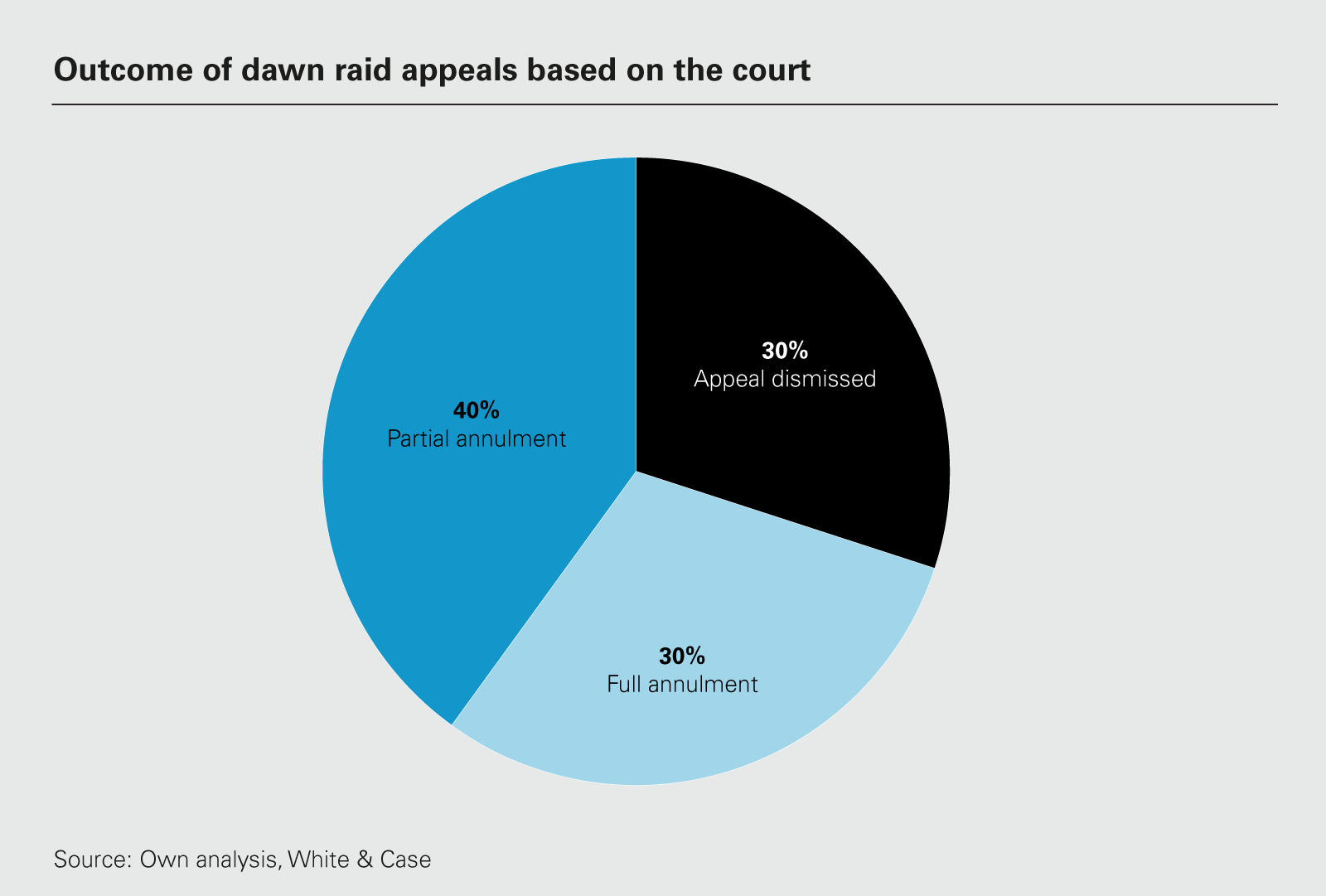 View full image: Outcome of DR appeals based on the Court (PDF)
View full image: Outcome of DR appeals based on the Court (PDF)
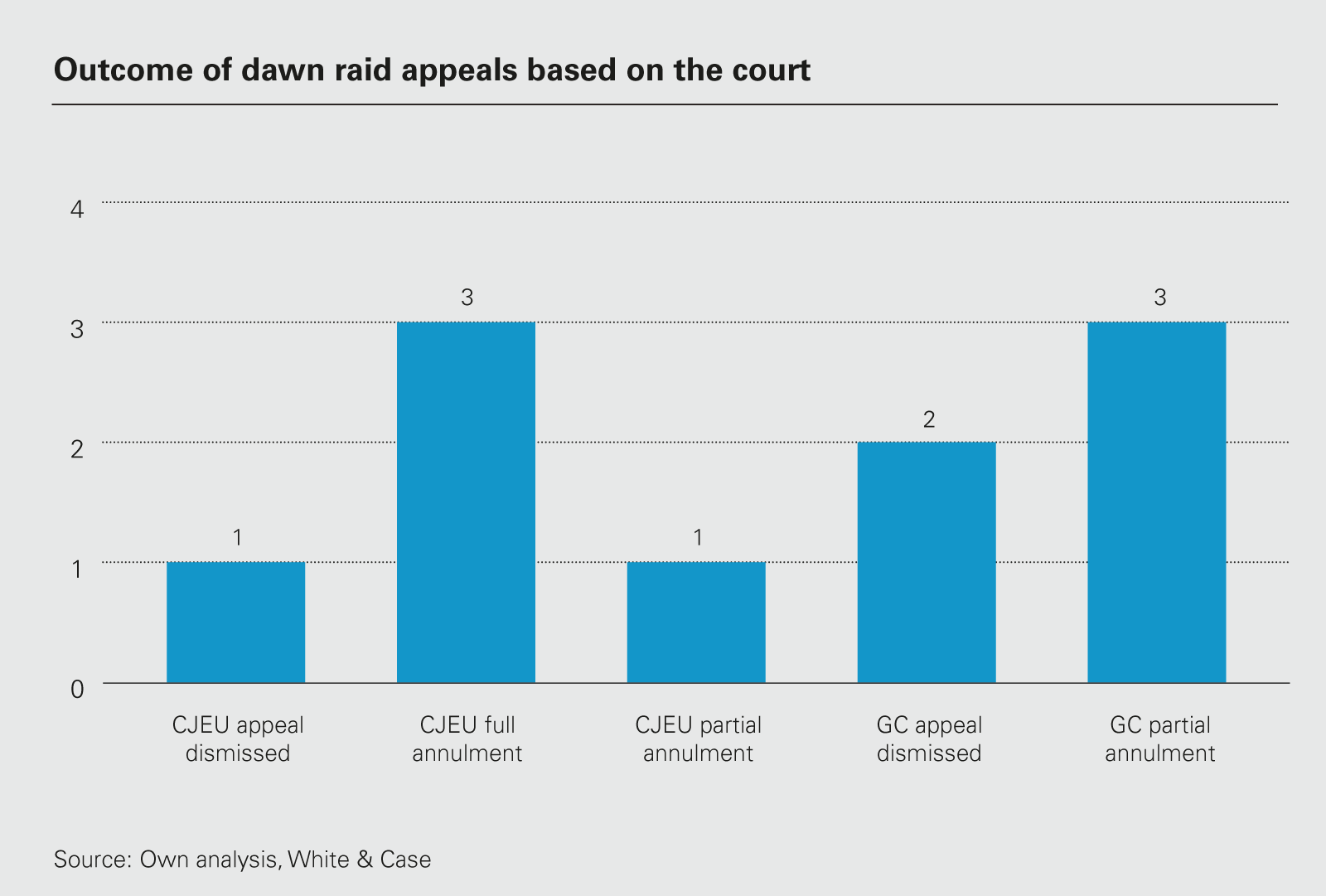 View full image: Outcome of DR appeals based on the Court (PDF)
View full image: Outcome of DR appeals based on the Court (PDF)
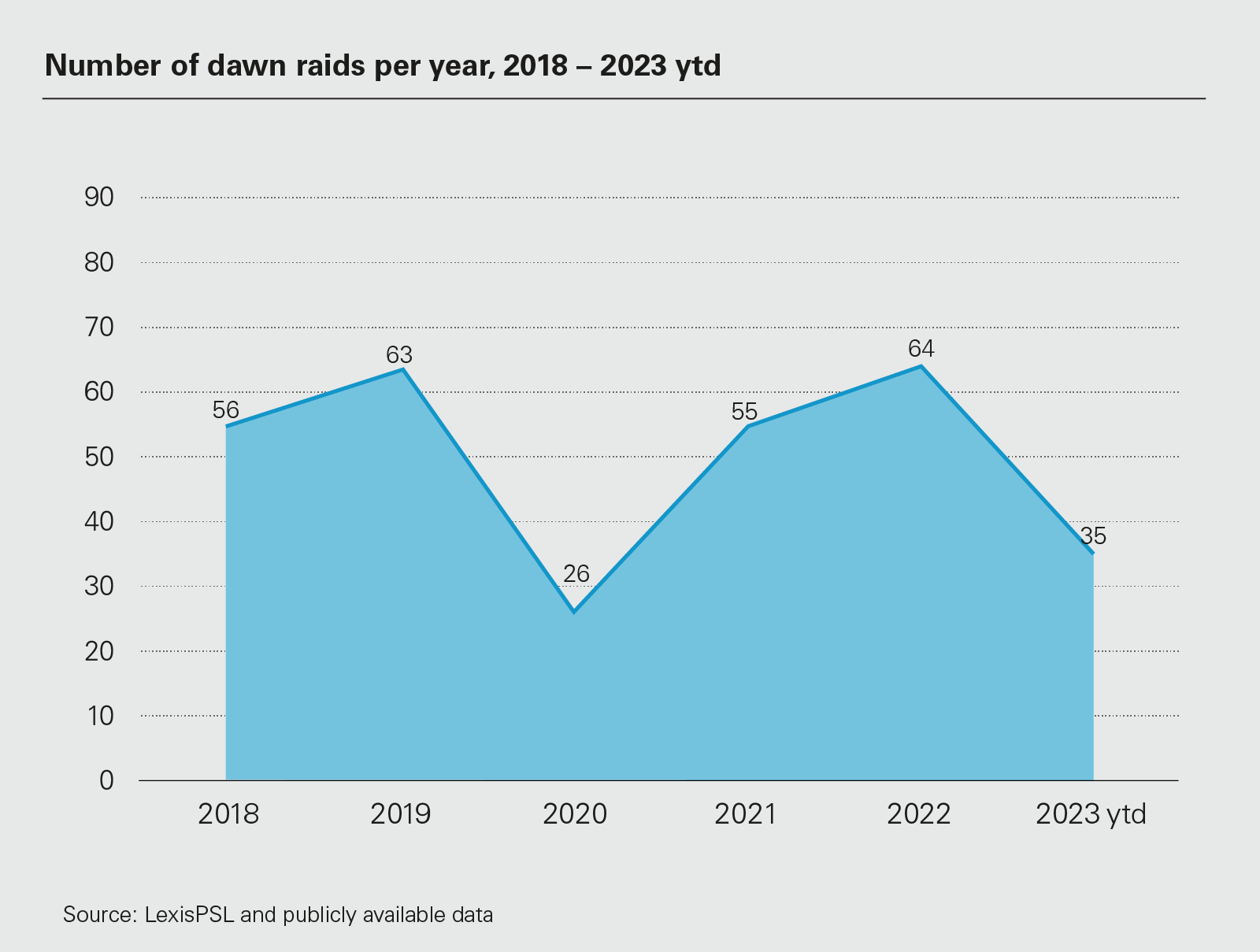 View full image: Number of dawn raids per year, 2018 – 2023 ytd (PDF)
View full image: Number of dawn raids per year, 2018 – 2023 ytd (PDF)
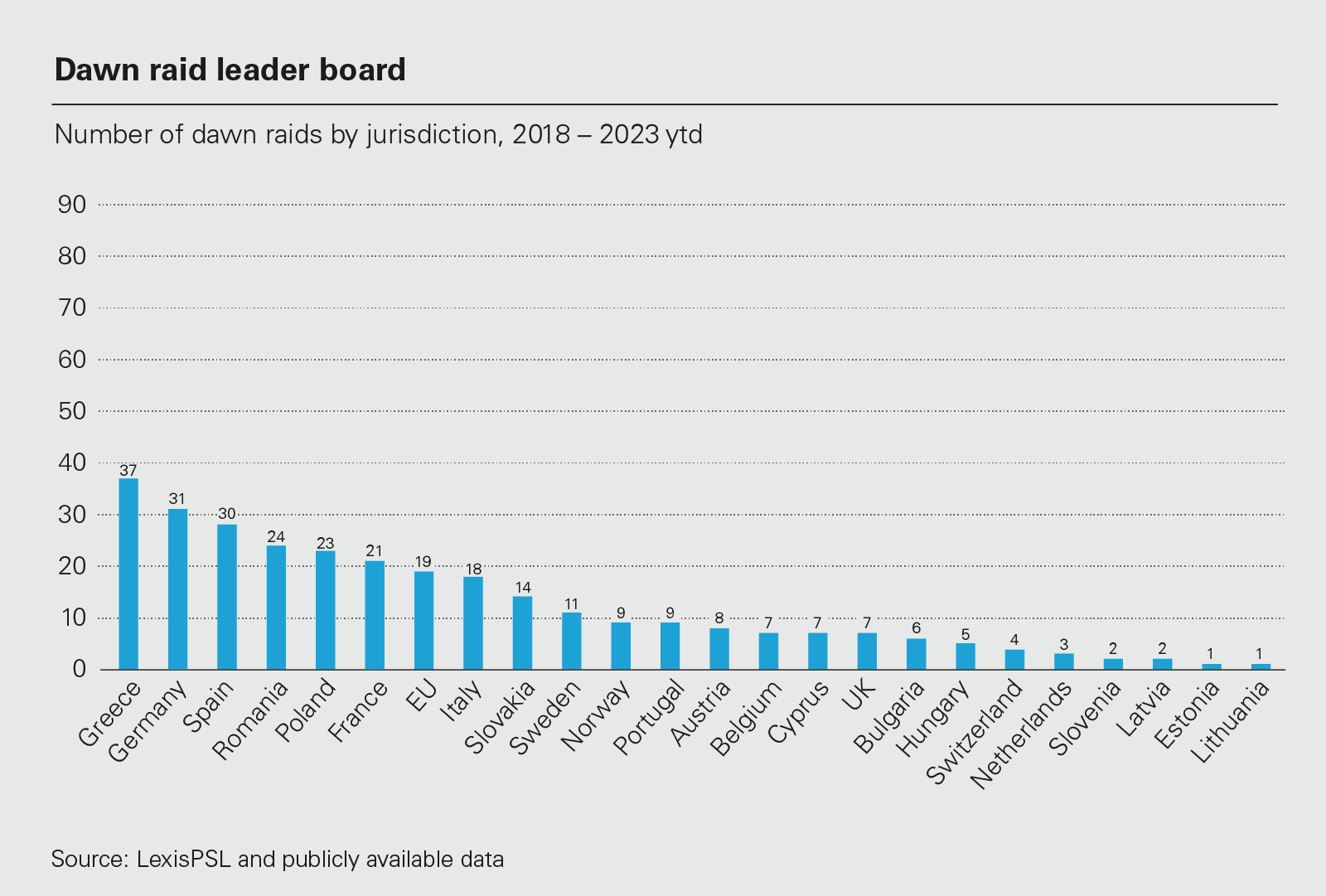 View full image: Number of dawn raids by jurisdiction, 2018 – 2023 ytd (PDF)
View full image: Number of dawn raids by jurisdiction, 2018 – 2023 ytd (PDF)
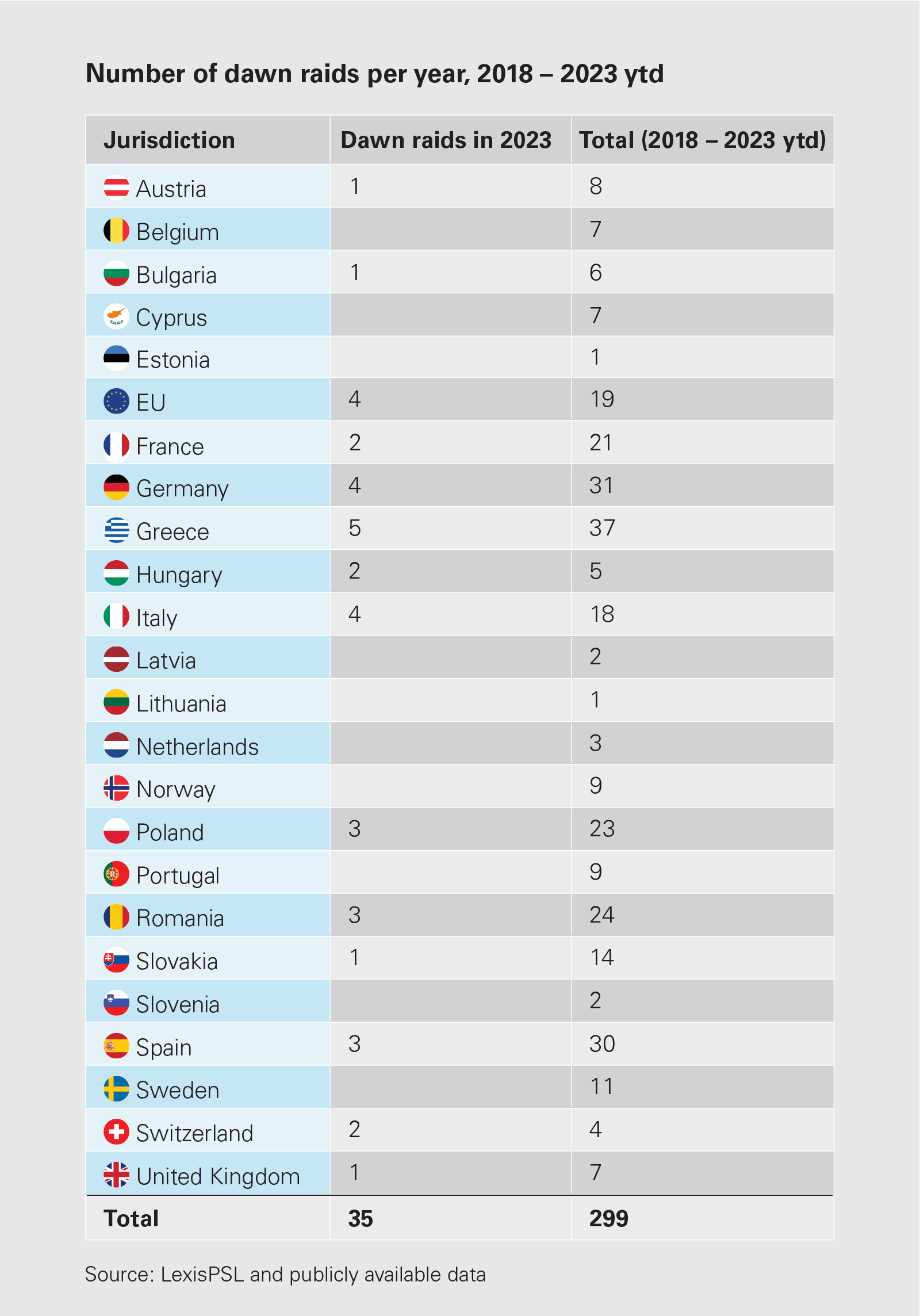 View full image: Number of dawn raids per year, 2018 – 2023 ytd (PDF)
View full image: Number of dawn raids per year, 2018 – 2023 ytd (PDF)
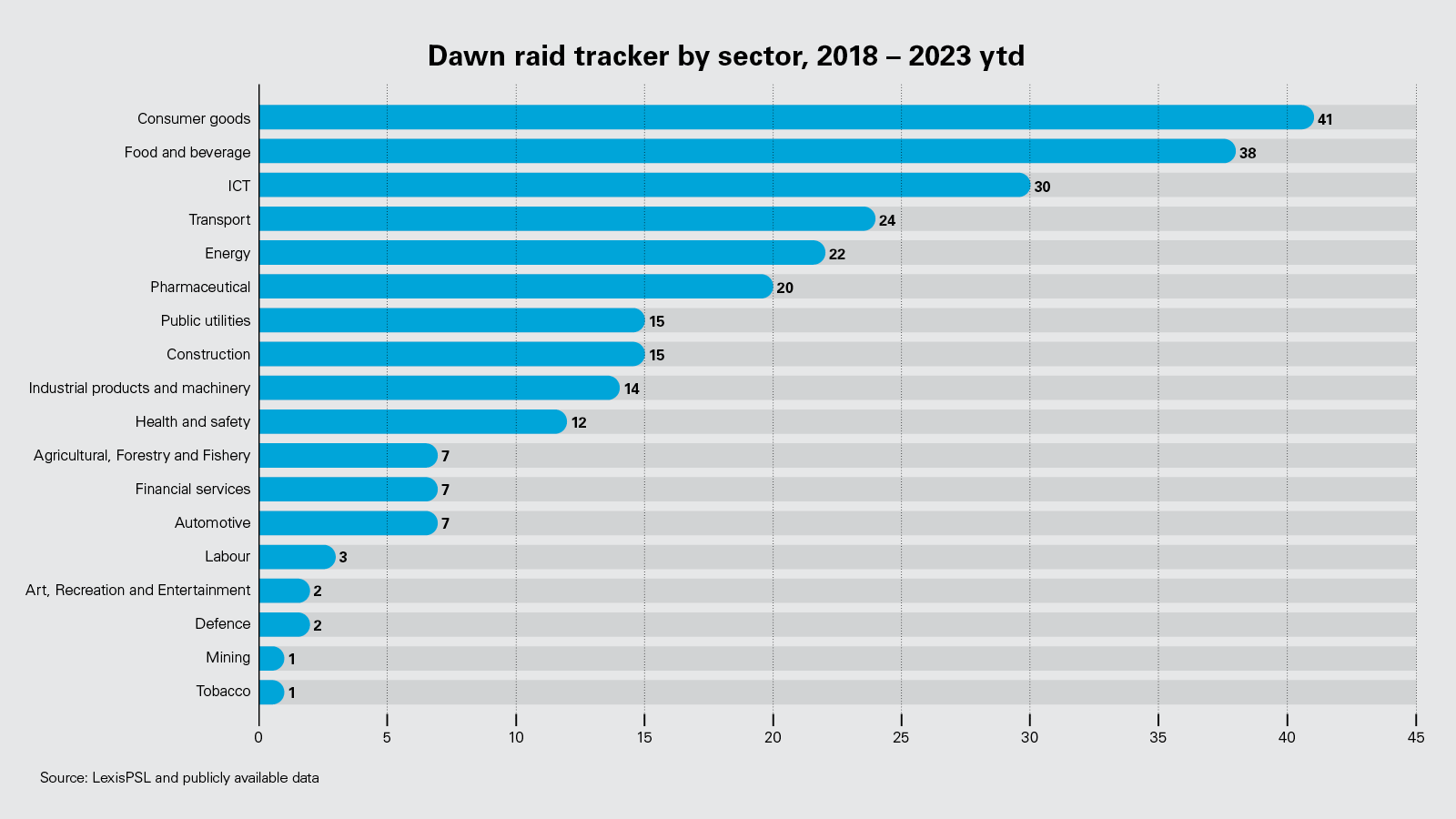 View full image: Dawn Raid tracker by sector, 2018 – 2023 ytd (PDF)
View full image: Dawn Raid tracker by sector, 2018 – 2023 ytd (PDF)
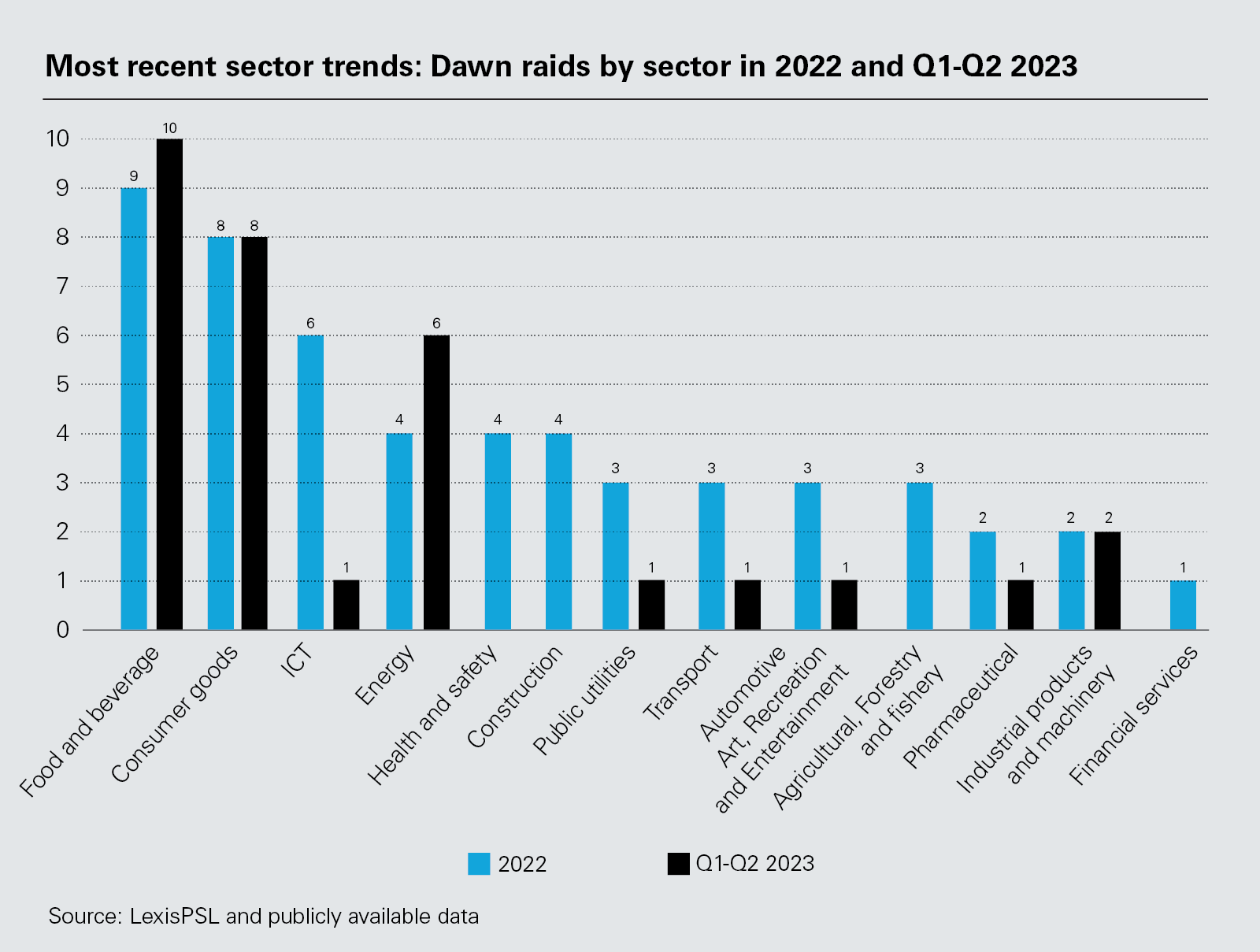 View full image: Most recent sector trends: Dawn raids by sector in 2022 and Q1 2023 (PDF)
View full image: Most recent sector trends: Dawn raids by sector in 2022 and Q1 2023 (PDF)